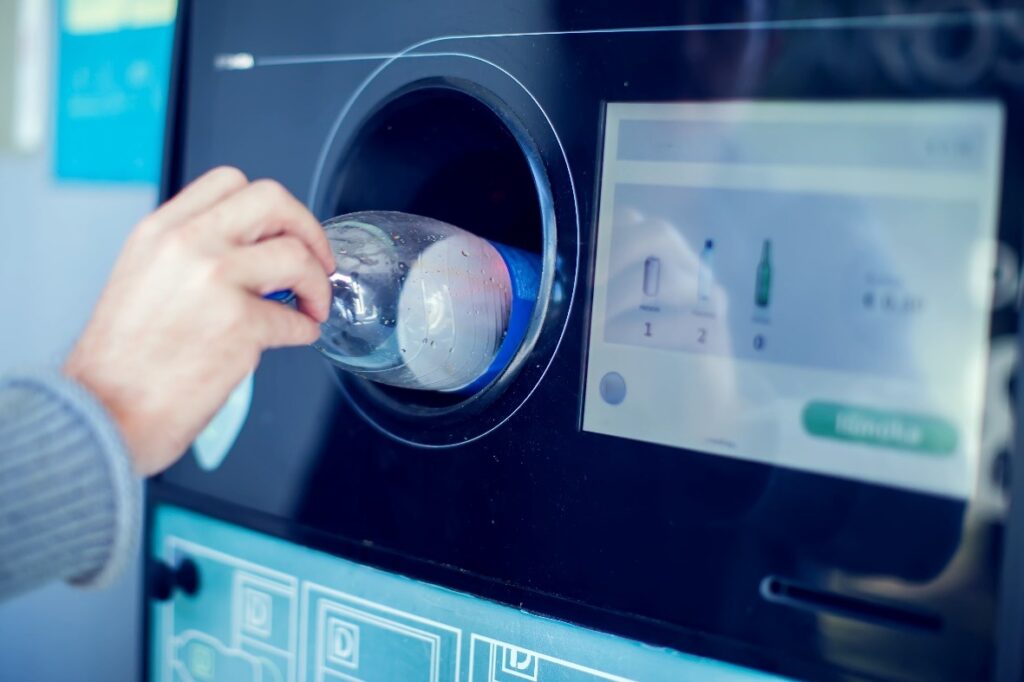CALL NOW FOR A FREE QUOTE 866.760.8194
Why Bottle Deposits Work for Some States
Beverage container deposit legislation, also known as “bottle bills,” is designed to reduce litter and encourage bottle recycling, functioning as a deposit-refund system for beverage containers.
What States Have Bottle Deposits?
Bottle deposits vary from two cents to fifteen cents, depending on the type of beverage and volume of the container. Currently, there are ten bottle deposit states that have these types of laws in place, including:
- California
- Connecticut
- Hawaii
- Iowa
- Maine
- Massachusetts
- Michigan
- New York
- Oregon
- Vermont
How Do Bottle Deposits Work?

Can and bottle deposits were originally introduced in Oregon in 1971 as a way to address the growing litter problem along the state’s beaches and highways. Since then, other states have passed similar laws to clean up the roads and encourage recycling.
Bottle bills require the state to offer a minimum refund on beverage containers as a way to increase bottle recycling efforts by consumers. The process works like this:
- When a retailer buys beverages from a distributor, a deposit is paid to the distributor for each container.
- The consumer then pays the deposit to the retailer when purchasing the beverage but will receive a refund of that deposit when the empty container is returned to a redemption center.
- The distributor reimburses the redemption center the deposit amount for each container, plus a handling fee.
Benefits of Bottle Bills
Along with getting a small amount of money for each bottle returned, there are other benefits enjoyed by bottle deposit states. Studies by the Container Recycling Institute have shown that states with bottle bills have much higher material recovery rates, which keeps container litter off the streets and supports the recycling industry.
Because glass and plastic can be recycled, replacement production, which also creates more pollution, decreases. The guaranteed monetary incentive of receiving the deposit back also increases the likelihood that consumers will return the bottles, which keeps them from going into the landfill.

According to the American Beverage Association, “Comprehensive recycling programs like curbside collection provide an easy and effective way for consumers to recycle their household waste, including beverage bottles and cans.” However, in many states, curbside collection efforts for glass have become problematic, as most of it ends up in the landfill rather than the recycling plant.
Recycling data has shown that both systems, when combined, guarantee the highest rate of glass recycling, and by default all recycling efforts. Many experts encourage states to keep their bottle bills in place.
Streamlining Processing for Bottle and Can Deposit States
Using bottle and can deposit programs in combination with voluntary business and household recycling pickup can move more of the material back into the recycling centers with consumers doing some of the hauling themselves. Investing in industrial recycling equipment, including compactors and balers, will lower the costs of moving recycled cans and bottles in their loose state.
If your business is struggling to manage the volume of recyclables generated by bottle deposit laws and legislation, contact us today to find out how to reduce storage, collection, and transportation costs tomorrow!
Recent Post
Is Hiring a Waste Consultant Right for Your Business?
Managing waste and recycling needs poses a distinct hurdle for businesses focused on…
Read More >Understanding Scope 3 Emissions
Scope 3 emissions are an important component of a company’s total greenhouse gas…
Read More >